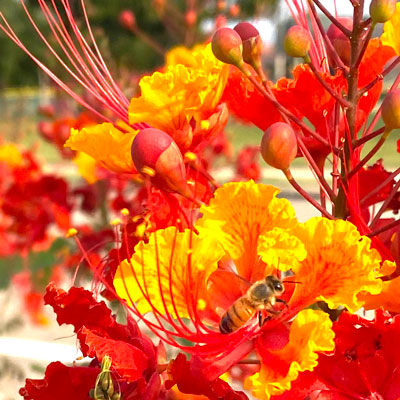Pride of Barbados

The prettiest display of Pride of Barbados that I ever saw was along the San Antonio River Walk down near the Convention Center. The plants themselves were beautiful enough as they covered themselves with the raucous red/orange/yellow blooms, but the fact that Giant Swallowtails were engulfing the plants took my breath away. I stood there for 20 minutes taking photo after photo.
We Texans need plants that can stand up to the heat and sun, that will bloom from late spring clear through until frost and that can give us flamboyant color all the while, and there’s no better example than this one. If only it were winter-hardy farther north than it is, but oh, well. That’s why nurseries offer it each spring for those of us who don’t live in the southern half of the state.

So, let me tell you about it…
• Scientific name: Caesalpinia pulcherrima (Pea Family)
• Common names: Pride of Barbados, Red Bird of Paradise, Dwarf Poinciana, Dwarf Flamboyan and Peacock Flower.
• Winter hardiness: USDA Zones 9-11. Woody shrub in South Texas. Tender perennial in I-20 corridor. Treated as tropical annual in colder northern parts of the state.

• Light: Sun or afternoon shade (full morning sun until early afternoon.
• Size: 5-10 ft. tall and wide (larger in South Texas than in North Texas).
• Flowering season: summer through fall.
• Color: orange, yellow and red.

• Soil requirements: adaptable but requires good drainage.
• Water needs: drought-tolerant, but blooms best if kept moist through growing season.
• Foliage: fine-textured, but stems have spines.

• Attracts: bees, Giant Swallowtail butterflies.
